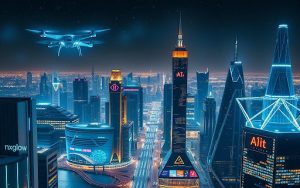Address
304 North Cardinal St.
Dorchester Center, MA 02124
Work Hours
Monday to Friday: 7AM - 7PM
Weekend: 10AM - 5PM
Address
304 North Cardinal St.
Dorchester Center, MA 02124
Work Hours
Monday to Friday: 7AM - 7PM
Weekend: 10AM - 5PM
As we look ahead, it’s clear that AI innovations will deeply impact our lives and the global economy. By 2030, McKinsey estimates AI could add around $13 trillion, highlighting its transformative power across industries. The current AI landscape shows rapid progress in machine learning, with new technologies entering sectors like finance, manufacturing, and healthcare. This piece will dive into these advancements and how AI will shape our society, laying the groundwork for a deeper understanding of its role.

AI technology has revolutionized business operations, introducing cutting-edge AI solutions that boost productivity and efficiency. At its heart, artificial intelligence leverages machine learning, deep learning, and neural networks. These tools allow systems to analyze vast data, identify patterns, and make strategic decisions. This is vital for businesses seeking to remain competitive.
Companies like Google and Amazon showcase AI’s successful application in the business world. Google’s algorithms handle massive search queries with unmatched accuracy. Amazon’s recommendation engine, on the other hand, analyzes consumer behavior to suggest products, elevating user satisfaction and sales.
The rapid evolution of artificial intelligence trends demands that industries stay agile. As companies embed AI solutions into their workflows, they unlock unprecedented innovation and creativity. By regularly updating their strategies to align with these advancements, businesses not only keep pace but also lead in their sectors.
The evolution of generative AI has revolutionized various domains, enabling machines to create content, art, and complex code. This advancement showcases the immense AI creativity and the innovative strides in AI technology. For instance, OpenAI’s GPT-3 demonstrates how generative AI can mimic human writing styles with remarkable accuracy.
In the art world, generative AI has opened new avenues for creativity. Artists now use AI tools to generate digital art, blending technology with human expression. This synergy leads to surprising results that redefine artistic boundaries. Music production also benefits, as AI assists composers in generating melodies and arrangements, fostering a fresh wave of creativity.
Industry experts highlight that the transformative power of generative AI extends beyond traditional fields. It reshapes creative industries by providing tools that augment human capabilities. Professionals can focus on higher-level creative processes while AI handles the detailed work.
Natural language processing (NLP) is a key area of innovation in AI communication. It allows machines to understand, interpret, and create human language. This has led to the development of chatbots and virtual assistants like Siri and Alexa, which can now interact with users more effectively.
Recent studies have shown significant improvements in NLP applications. These models can now analyze sentiment, extract keywords, and summarize texts more efficiently. This enables businesses and individuals to use AI for better customer interactions, workflow optimization, and personalization.
Despite the progress, NLP faces several challenges. Issues include understanding context, handling ambiguity, and processing different dialects and jargon. To overcome these, continuous research and development are necessary. This ensures these technologies keep up with the evolution of human language.
| Application | Description | Key Benefits |
| Chatbots | Automated conversation agents for customer service. | 24/7 availability, quick responses, cost reduction. |
| Virtual Assistants | Help users manage tasks and answer questions. | Personalization, accessibility, task automation. |
| Sentiment Analysis | Determine user sentiment from text input. | Improved feedback interpretation, targeted marketing. |
| Language Translation | Convert text or speech from one language to another. | Global reach, enhanced communication, cultural exchange. |
NLP advancements are reshaping the future of AI communication, opening up new opportunities for businesses and consumers. As these technologies become more integrated into our daily lives, understanding them will become increasingly important.
The technology landscape is rapidly changing, with a focus on artificial intelligence advancements. For businesses to remain competitive, understanding emerging AI trends is critical. Quantum AI, for instance, promises to revolutionize capabilities and applications. Companies must adapt to these shifts to ensure long-term success.
Emerging AI trends are reshaping the future of AI technology. These trends include:
The integration of AI in business operations has transformed strategies across various industries. Companies are using machine learning to improve decision-making. Studies by Bain & Company show that AI adoption leads to:
| Sector | Impact on Efficiency | Expected Revenue Growth |
| Retail | 30% improvement in inventory management | 15% increase by 2025 |
| Manufacturing | 25% reduction in maintenance costs | 20% growth in revenue |
| Healthcare | 40% enhancement in diagnostic accuracy | 10% reduction in operational costs |
These statistics highlight the tangible benefits of emerging AI trends. Companies embracing these technologies can use data-driven strategies to stay ahead in the market.
The integration of AI in healthcare is revolutionizing medical technology. AI applications are key in boosting diagnostic accuracy and streamlining treatments. Leaders like IBM Watson Health and Google Health are pioneering the use of machine learning to offer precise predictive analytics and tailored medicine.
Diagnostic AI systems stand out as a significant advancement. These systems employ sophisticated algorithms to analyze medical images and patient data, speeding up and improving diagnosis accuracy. For instance, AI has been shown to outperform human radiologists in detecting some conditions, highlighting its role in saving lives through early detection.
Machine learning in healthcare enables the analysis of vast data sets, uncovering patterns that lead to better treatment outcomes. Predictive analytics tools present data in a way that aids healthcare providers in anticipating patient needs. This reduces hospital readmission rates and optimizes resource use.
“The future of AI in medical technology holds promising solutions that can transform patient care and enhance operational efficiency.” – Industry Expert
Statistical data shows significant improvements in treatment efficiency with these technologies. Hospitals using AI-driven systems report higher patient satisfaction and shorter treatment times. Ongoing research and development in this field suggest a promising future for AI in healthcare, set to continue reshaping medical care delivery.
| Application | Impact | Example |
| Diagnostic AI Systems | Improves accuracy of diagnoses | AI-assisted radiology |
| Predictive Analytics | Reduces hospital readmission rates | Patient risk assessment tools |
| Personalized Medicine | Tailors treatments to individual needs | Genomic analysis for targeted therapies |

Autonomous systems are transforming industries by integrating AI robotics into daily operations. Self-driving cars, drones, and advanced manufacturing robots showcase the power of AI technology. Companies like Tesla and Boston Dynamics are at the forefront, achieving remarkable success with their innovations.
Tesla’s self-driving cars use a complex network of sensors and AI algorithms to navigate roads. This technology enhances safety and optimizes traffic flow. Boston Dynamics, on the other hand, is revolutionizing logistics with their robotics, making warehouses more efficient.
Yet, ethical concerns surround autonomous systems. Questions about liability in accidents involving self-driving cars pose significant regulatory hurdles. Drones in delivery services must comply with airspace regulations and privacy laws. As these technologies advance, ongoing discussions on governance are essential.
The rise of autonomous systems marks a shift towards greater AI reliance across sectors. This promises a future where humans and machines work together seamlessly. The integration of these solutions enables companies to concentrate on innovative strategies, leading to a transformed landscape.
The rapid advancement of artificial intelligence raises numerous ethical considerations and governance challenges. It is essential to establish frameworks for responsible AI use to build public trust as technology evolves. Governance in AI encompasses regulations, addressing bias, data privacy, and accountability. These are critical for ensuring ethical AI practices.
Organizations like the Partnership on AI are at the forefront, promoting ethical AI through governance structures. These frameworks lay the groundwork for AI regulations that are both effective and inclusive. The challenge is to balance innovation with the responsibility to protect individuals’ rights and privacy.
AI regulations must tackle core concerns, including:
AI ethicists stress the need to integrate ethical AI principles throughout the technology lifecycle. By fostering a culture of transparency and cooperation, we pave the way for responsible AI use. This encourages innovations that respect societal values.
Smart cities represent a groundbreaking concept, blending urban development, IoT technology, and AI urban planning. They use IoT and AI to refine infrastructure, boost public services, and elevate resident quality of life. The vision of smart cities includes traffic systems that manage flow in real-time, reducing congestion and emissions.
Cities like Singapore and Barcelona showcase these technologies in action. Singapore’s smart traffic system employs sensors and AI to streamline traffic, cutting down on delays and emissions. Barcelona’s smart energy grids, on the other hand, use IoT to track energy use, ensuring efficient resource distribution.
Public safety is a cornerstone of smart city initiatives. AI and IoT systems analyze data from cameras and sensors to spot anomalies, enabling authorities to act swiftly in emergencies. This collaboration between technologies creates a safer urban space, highlighting AI’s role in urban planning.
As urban populations expand, smart cities become more critical. The fusion of IoT and AI tackles current issues and sets the stage for sustainable growth and efficient management. By embracing innovation and these technologies, cities can build resilience and adaptability for the future.
The future of AI innovations promises significant changes across various sectors, transforming our lives and work environments. Advancements in generative AI and natural language processing are leading to more intuitive human-machine interactions. These developments have far-reaching implications, touching everything from healthcare to smart city initiatives.
Yet, with these advancements comes a critical responsibility. It’s essential to balance innovation with ethical considerations, ensuring AI aligns with societal values. Industry leaders stress the need for adaptable governance frameworks. This will allow us to benefit from AI while managing its risks.
In summary, AI’s role in shaping human experiences will be significant. By staying updated on trends and understanding AI’s implications, we can create a future where technology enhances our lives. This will improve the quality of life for everyone.
The future of AI technology is bright, with advancements in machine learning, generative AI, and natural language processing leading the way. Experts foresee AI adding around $13 trillion to the global economy by 2030. This growth will be driven by innovation and efficiency.
Businesses are embracing AI to boost efficiency and streamline operations. Giants like Google and Amazon are using AI for customer service and data analytics. This integration aims to enhance decision-making and performance.
New AI technologies include deep learning, autonomous systems, and AI applications in healthcare. Quantum AI is also emerging, promising faster and more efficient data processing. These advancements are set to transform various sectors.
Generative AI creates content like text, images, and music using algorithms. OpenAI’s GPT-3 is a prime example, generating human-like text from input data. This showcases AI’s creative capabilities.
NLP enables machines to understand human language, making communication more intuitive. It’s used in virtual assistants and chatbots. Improved NLP technology has enhanced text interpretation and user engagement.
AI is transforming healthcare with diagnostic systems, predictive analytics, and personalized medicine. IBM Watson Health and Google Health are leading this transformation. They aim to improve treatment efficiency and patient outcomes.
Autonomous systems are used in self-driving cars, drones, and robotic manufacturing. Companies like Tesla and Boston Dynamics are pioneering these technologies. They aim to automate processes and enhance performance across industries.
Ethical AI governance ensures responsible AI use, preventing bias and data privacy issues. Organizations like the Partnership on AI advocate for ethical standards. They aim to establish accountability in AI development.
Smart cities use AI and IoT for better urban planning and infrastructure. They implement smart traffic management and energy grids. This improves public safety and resource efficiency, as seen in cities like Singapore and Barcelona.